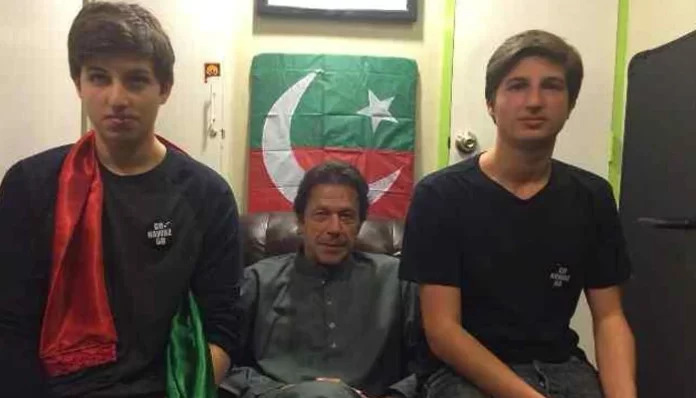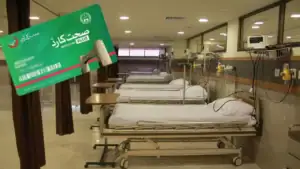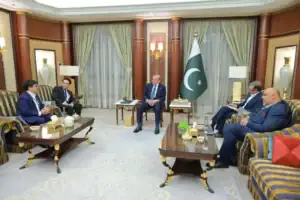Suleman Khan (28) and Qasim Khan (26), the British-based sons of former Prime Minister Imran Khan, have applied for visit visas to Pakistan as part of preparations for a planned protest movement calling for their father’s release from incarceration, political and party sources have confirmed.
The Pakistan Tehreek‑e‑Insaf (PTI) has strongly denied prior media claims that Imran Khan had barred his sons from entering Pakistan, with Central Information Secretary Sheikh Waqas Akram stating that those reports were “completely false” and taken out of context.
Aleema Khanum, sister of Pakistan Tehreek-e-Insaf (PTI) founder Imran Khan, confirmed Friday that her nephews — Sulaiman and Kasim Khan — have applied for Pakistani visas and are awaiting clearance from the Ministry of Interior in Islamabad.
In a post on X (formerly Twitter), Aleema stated: “A few days ago, Suleiman and Kasim applied for their visas with the Pakistan High Commission in London. The ambassador has intimated that he is awaiting approval from the Ministry of Interior in Islamabad.”
The announcement comes amid mounting speculation over the sons’ planned visit to Pakistan. The development also reignited a political spat, with Minister of State for Interior Tallal Chaudhry questioning the need for visas if, as previously asserted, the two held National Identity Cards for Overseas Pakistanis (Nicop).
“If they do need visas, that means they are not ‘Pakistani nationals’. What is the real truth behind it all?” Chaudhry remarked, casting doubt on earlier statements made by Aleema Khanum.
Imran Khan’s sons — Sulaiman, 28, and Kasim, 26 — had largely remained out of the spotlight until May this year, when they publicly addressed their father’s imprisonment for the first time. Last month, Aleema said they planned to visit the United States to engage lawmakers on the issue, before traveling to Pakistan in support of a global campaign for their father’s release.
The former prime minister has been incarcerated at Rawalpindi’s Adiala Jail since August 2023, serving a sentence in the £190 million Al-Qadir Trust corruption case. He also faces several pending charges under the Anti-Terrorism Act stemming from the violent protests that followed his arrest on May 9, 2023.
Aleema previously maintained that her nephews would “definitely” come to Pakistan, claiming they held Nicop cards and were “citizens of Pakistan.” She also warned that any harm to the siblings would carry “international consequences.”
Earlier this week, the PTI rejected media reports suggesting that Imran Khan had told visitors at Adiala Jail that his sons would not return to Pakistan or lead any protests.
Though the federal government has not issued an official stance on the visa applications, Chaudhry earlier stated there would be “no obstacle” for their visit, and that visas could be issued “within 24 hours” provided the siblings obey the law.
Minister of State for Law and Justice, Barrister Aqeel Malik, added that while Pakistani citizens are entitled to the right of assembly under Article 16 of the Constitution, the same does not apply to foreign nationals. “Foreigners are not allowed to assemble in Pakistan,” he told Dawn.com.
The visa row continues to stir public and political interest, as questions persist over the legal status of Imran Khan’s sons and what role — if any — they will play in their father’s political struggle.
Akram reiterated that there is “no doubt” they will travel to Pakistan, although the specific date has not yet been finalized, and emphasised that the brothers had informed their father of their decision rather than seeking permission.
Government officials have said Suleman and Qasim face no legal barriers to obtaining visit visas, provided they comply with visa regulations and refrain from political activity, which would violate the terms of their status as foreign nationals.The Interior Ministry has stated that visa issuance could take less than 24 hours if no issues arise.
However, senior ministers including those in the law and justice and political affairs portfolios have warned that the government may deny their entry or arrest them should they participate in protest activities inside Pakistan. State Minister Aqeel Malik stressed that as British nationals, they are not permitted to engage in local political mobilization under Article 16 of the Constitution.
The developments follow earlier comments from former Prime Minister Khan’s sister, Aleema Khan, who confirmed that the brothers would first travel to the United States to make international appeals before proceeding to Pakistan to take part in the protest movement for their father’s release.
Kassim and Suleman Khan previously made public appeals earlier this year, calling for international pressure on Pakistan over their father’s prolonged detention and alleged denial of basic rights in jail. The brothers delivered a rare public statement in May, expressing frustration over irregular communications and inhumane prison conditions for their father—including solitary confinement and isolation from legal and medical support.
Political Context & Legal Considerations
While PTI insists the visit is strictly a family matter rather than a political maneuver, the government remains cautious about any potential rallies or public events involving the brothers. Defence Minister Khawaja Asif described the situation as a “drama among many dramas,” suggesting the possibility of political exploitation.
READ MORE: Former Pakistani PM Imran Khan Nominated for Nobel Peace Prize
Legal experts have reinforced that foreign nationals in Pakistan cannot engage in political protests, and such actions could lead to visa cancellation or legal consequences.
What’s Next
As the application for visit visas is processed, close watchers anticipate whether Suleman and Qasim will arrive in Pakistan in time to coincide with PTI’s planned protest campaign. Although PTI has not confirmed exact travel dates, many expect them to arrive ahead of the proposed August protest to lend symbolic support to their father’s cause.
Continued developments will unfold amid rising tensions between PTI advocacy efforts and the government’s warnings of possible action should the visit evolve into political mobilization.









